Are you totally over your allergies, slow metabolism, chronic pain, acne, or autoimmune issues? Believe it or not, your health problems could be caused by what you are eating. Put a stop to it by eating foods that help heal your leaky gut.
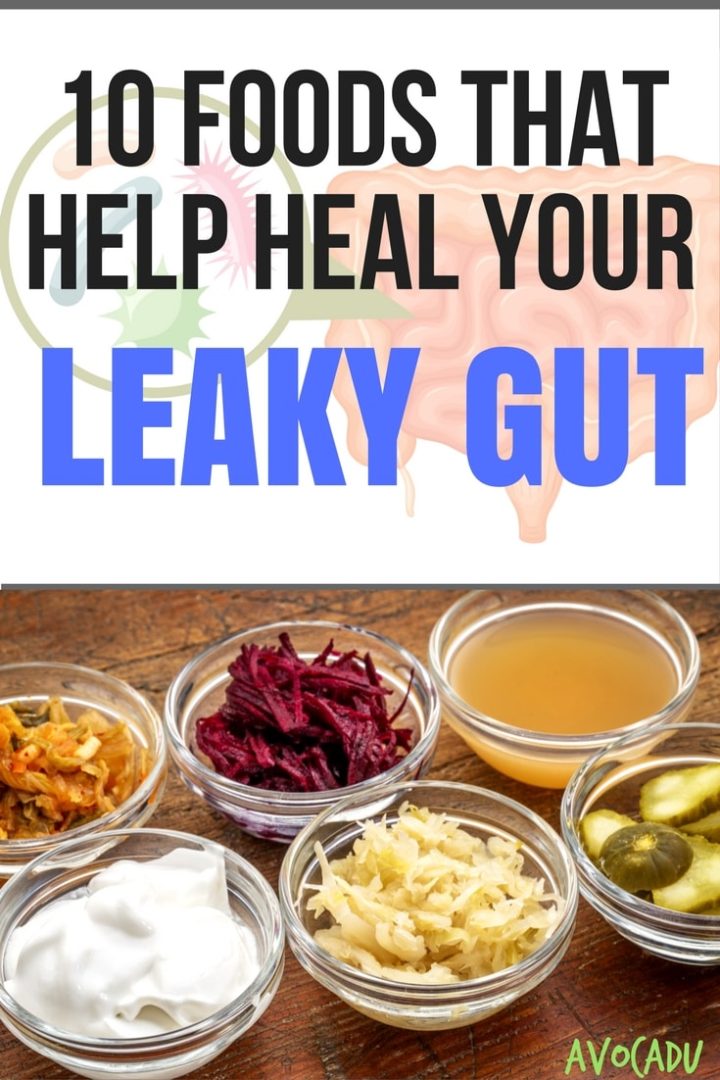
If you mention Leaky Gut Syndrome, which is also called intestinal hyperpermeability, to a conventional physician, you’ll probably get a negative response. They might snort or roll their eyes, so be prepared.
A leaky gut happens when the walls of our intestines get perforated or too thin, which allows large food molecules, metals, and microorganisms to pass through them and into the bloodstream.
Normally, the intestinal lining keeps all our yucky waste where it belongs.
When the toxins, pathogens, and antigens that our intestines are supposed to protect us from get into the bloodstream, they provoke an inflammatory response that can cause a bunch of health problems.
Not only is it gross to think about, but leaky gut can be responsible for some pretty serious health issues like Parkinson’s, Autism, Celiac disease, and Type 1 diabetes.
There are many ways to get a leaky gut. Here are a few:
- Poor diet
- Genetics
- Gluten sensitivity
- Alcohol
- Medications like NSAIDs and antibiotics
- Yeast infections
- Environmental toxins
- Chronic stress
While there is no miracle quick-fix for a leaky gut, what we eat can have a huge impact on gut health, and in some cases, even heal it completely. Here are some foods that can help.
10 Foods That Help Heal Your Leaky Gut
Bone Broth
Bone broth is exactly what it sounds like; it’s broth made from boiling bones and meat in water.
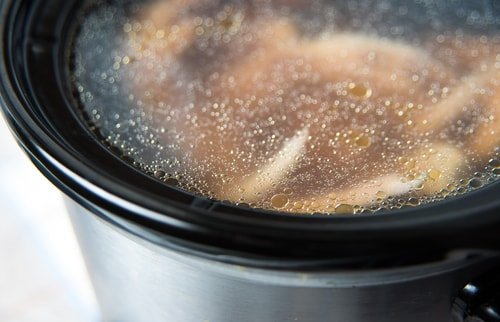
Have you ever noticed how a cup of chicken soup makes you feel better when you’re sick? One of the reasons might be that it’s made with chicken on the bone.
Bones are an incredibly rich source of amino acids, protein, and minerals that are known to improve nutritional deficiencies. They also contain collagen, which can reduce intestinal inflammation and nourish the lining.
The collagen gets broken down into gelatin when it’s cooked, which supports the mucus in your gut that protects intestinal cells. A bonus is that it’s great for your skin, hair, and nails!
Coconut Oil
Cooking with coconut oil is a delicious way to promote gut health.
If you’re worried about the saturated fat in coconut oil going straight to your thighs or arteries, you can rest easy because it’s a totally different kind of fat than the bad stuff in meat and dairy.
The fat in coconut is lauric acid, which is antimicrobial and antifungal. It’s also anti-inflammatory and will soothe irritated intestines.
Fermented Foods
Fermented foods like tempeh, sauerkraut, miso, and kimchi are all loaded with probiotics, which can keep our gut health balanced by encouraging the growth of good bacteria.
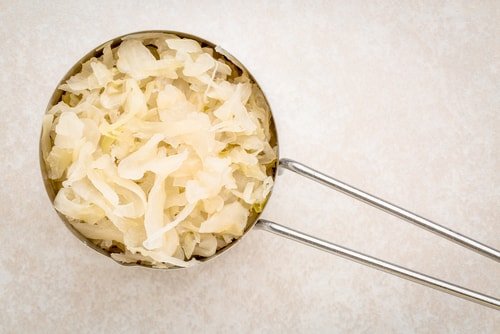
They also keep the digestive system clean and free of candida overgrowth, which will help the healing process.
Yogurt and kefir are also good sources of probiotics, but be cautious about consuming any dairy products until your gut is healthier and/or you know you don’t suffer any adverse effects from it. Dairy contains arachidonic acid, which causes inflammation in the digestive system.
Many people with leaky gut are also lactose intolerant, so kefir and yogurt made from coconut milk may be a better choice.
Pineapple
Pineapple isn’t just a yummy garnish on a piña colada, it’s a powerful super food that can have a big impact on gut health. It’s loaded with compounds that help maintain balance in the digestive system.
One pineapple contains 1328 mg of potassium, 60mg of iron, 9mg of zinc, 91mg of manganese, and 7mg of copper, all essential nutrients.
Pineapple can also be a bit acidic on your stomach, so please don’t eat an entire pineapple in one sitting! It’s too much of a good thing (and too much sugar), so stay balanced and just eat a few slices.
It has high concentrations of the enzyme bromelain in it, which research has shown to effectively fight off candida overgrowth, a major cause of leaky gut.
If you eat a lot of sugar and carbs, you’ve probably got too much candida in your system. Bromelain will gobble it right up, helping to restore balance.
Healthy Fats
The term “healthy fats” sounds like a bit of an oxymoron, right? We’ve been conditioned to believe that any fat is a bad thing, but it’s not true.
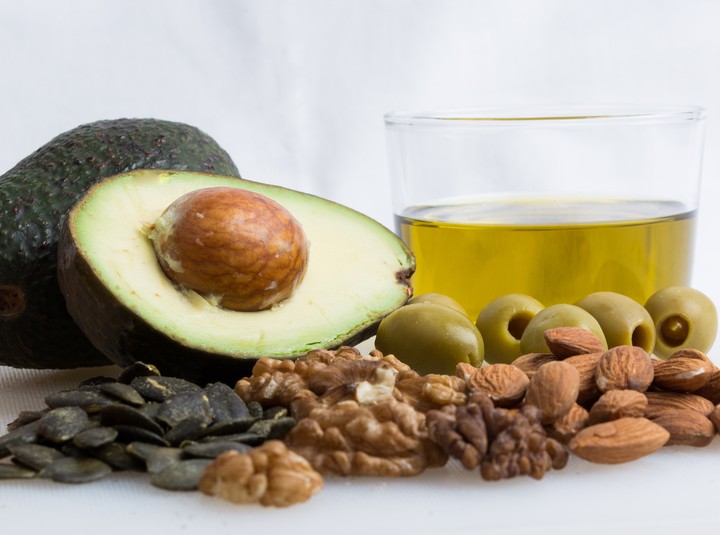
The healthy fats found in foods like avocados, egg yolk, coconut oil, ghee, olive oil, and salmon can lower cholesterol, improve digestion, and reduce inflammation.
They contain things that are good for the body, like omega 3 fatty acids, which help reduce inflammation, and vitamins A, D, E, and K.
Grass-Fed Meat
It’s important to remember that what your meat eats, you eat. If you have a wheat allergy and the burger you just chowed down was made from grain-fed cows, you’re probably not going to feel that great afterward.
Free-range chickens, cows, and turkeys eat plants and grass, which are rich in nutrients that are good for digestion. Factory farmed animals are fed corn and wheat, which are known to cause inflammation.
Many animals raised for consumption are also injected with hormones and antibiotics, which are known to cause a leaky guy.
I know that it can be hard to go organic without breaking the budget, but in the very least, make sure to choose meat that comes from animals that are hormone and antibiotic-free when it’s feasible and affordable! Buying frozen or on sale and then freezing can help keep costs down!
Steamed Vegetables
Raw vegetables are incredibly nutrient dense and healthy for us, but they can be difficult to digest for people with damaged guts. They have tough fiber, which is normally good for the digestive system but should be avoided until the intestines are healthier.
Steaming vegetables makes them easier to break down and they retain most of their nutrients, unlike many other cooking methods. Choose non-starchy vegetables to get the best results.
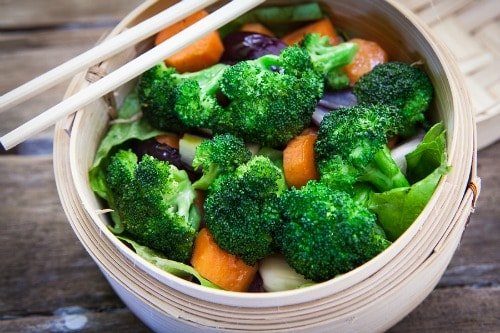
Alex, co-founder of Avocadu, actually wrote an entire article on his experience with how he couldn’t eat high-fiber “healthy” foods like brown rice and vegetables because of his damaged gut. You can read his whole story on how he healed his leaky gut and IBS and can now eat all the fiber-rich food his heart desires!
Low-Glycemic Fruits
Sugar can really irritate a damaged gut, but fruits have incredible healing powers, so don’t skip them altogether. Low-glycemic fruits like cherries, apples, grapefruit, and berries can help heal leaky gut.
Raw fruits normally contain fiber that’s easier to digest than raw vegetables, but some people do better eating fruits that have been blended or cooked and made into a sauce or preserve.
The less a food is processed, though, the more nutrient rich it is.
Apple Cider Vinegar
Some people love the taste of ACV, especially for its many uses, but you might want to hold your nose and down it like a shot of rotgut whiskey. It might be an acquired taste, but it’s one of the best healing remedies around.
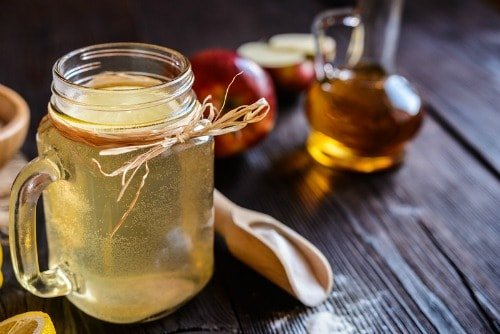
Always buy apple cider vinegar with the “mother” (other words to look for: organic, raw, unfiltered) and dilute it before using because it is too acidic to be taken straight.
We recommend mixing 1 tbsp with at least 8 ounces of water. You can dilute it further if the taste is still too strong for you.
Another great use to get it into your diet is to add it to a salad dressing. I like to mix it with olive oil, honey, and dijon mustard to create a healthy version of honey mustard dressing.
Its health benefits come from magnesium, potassium, enzymes, probiotics, acetic acid, and polyphenols. It helps decrease stress, lowers blood pressure, aids digestion, kills candida, and supports weight loss.
Peppermint
Mints were originally created to ease stomach cramps and help digestion, not to make your breath smell fresh. It’s a great herb to use when your leaky gut gives you gripping pains or makes you gassy.
Peppermint has menthol in it, which is a muscle relaxant. In order for your gut to get rid of waste, its muscles need to both tighten and relax, so the menthol can help that process.
Additional Help to Heal Your Leaky Gut
It will take time to heal your gut, so adding in a good probiotic AND making some or all of the above changes is the quickest way to reboot your system.
No matter what supplement you use, you should take AT LEAST 50 billion units of probiotics daily from a minimum of 10 different sources for best results.
While you don’t need to purchase only refrigerated probiotics, make sure the packaging is well sealed. It’s also essential that the packaging is dark (or opaque, not transparent) to protect from light damage.
We have our own brand of Probiotics at Avocadu called Gut-14.
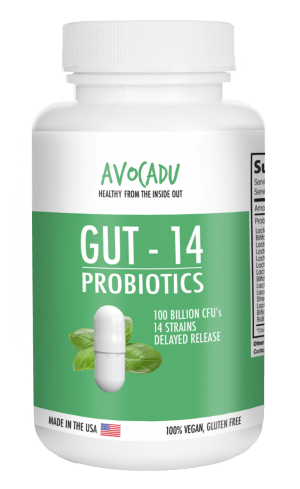
Our specially formulated probiotic supplement contains:
- Over 100 Million CFU’s Per Serving
- 14 Different Gut Healing Strains
- Delayed Release for Deeper Support
- Made in the USA
You can read more about it and why it’s so important for not only gut health but overall health on our probiotics page.
Probiotics are one of the best solutions for healing your gut, helping you lose weight faster, and providing you with a healthy source of gut flora every day!
Next, you will need to eat a healthy diet full of whole, natural foods!
Probiotics will help to get your gut started on the right track again, but it won’t make a very big impact if you are still eating a diet full of the WRONG foods that wreak havoc on your gut in the first place.
This is a big emphasis of our 21-Day Fat Loss Challenge as it’s about changing our eating habits and re-learning what we should and should not be eating.
People lose an average of 10-21 pounds in 21 days and absolutely love it! But even better than the weight loss is the feedback we get from people about how the program has taught them how to change their eating habits and find a diet that truly works for them in the long-term.
You can read more about how to get started with the 21-Day Challenge here.
Please feel free to leave a comment below if you enjoyed this article on the foods that help heal your leaky gut or if you have any questiosn!
Original article and pictures take avocadu.com site
Комментариев нет:
Отправить комментарий